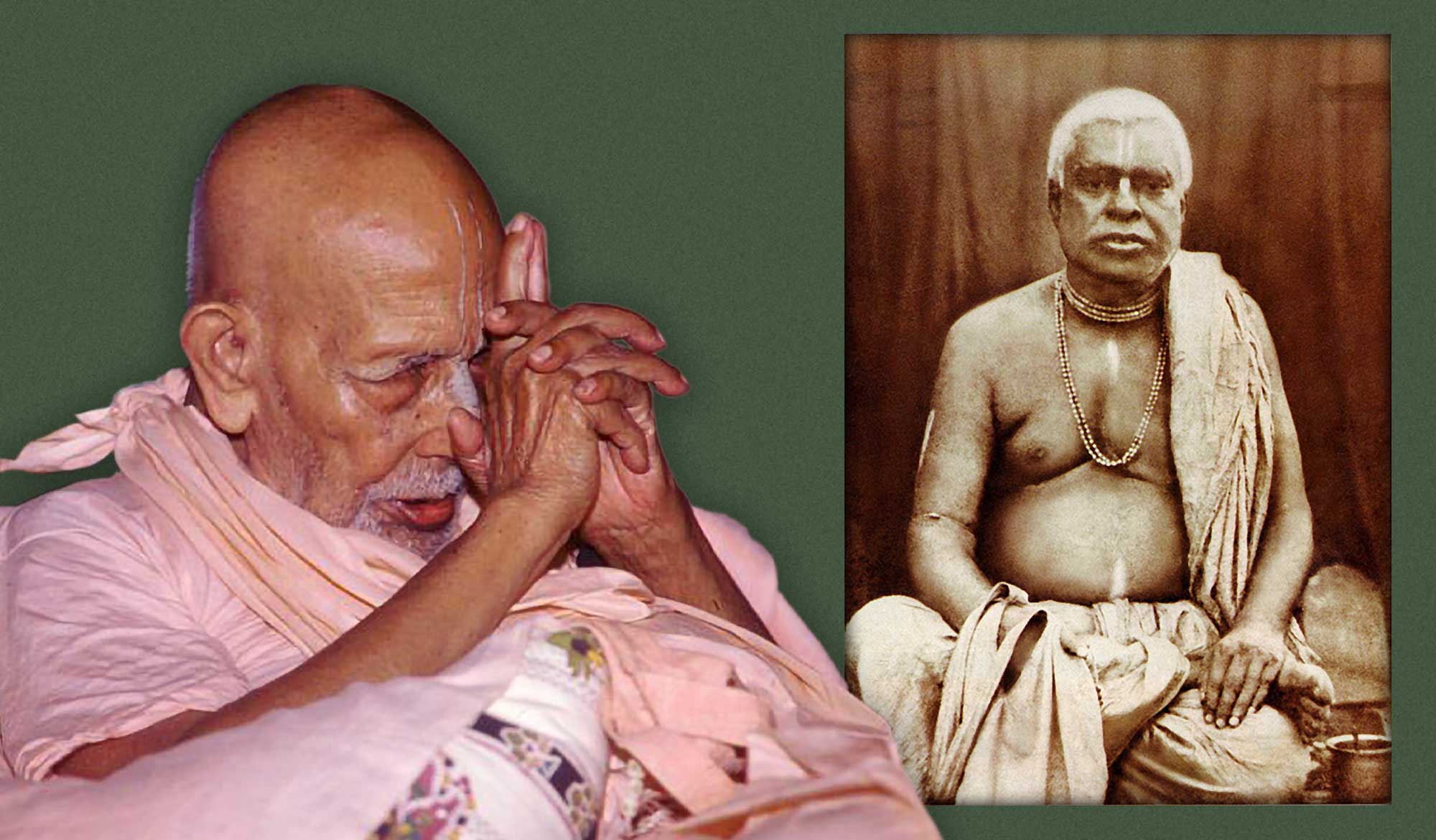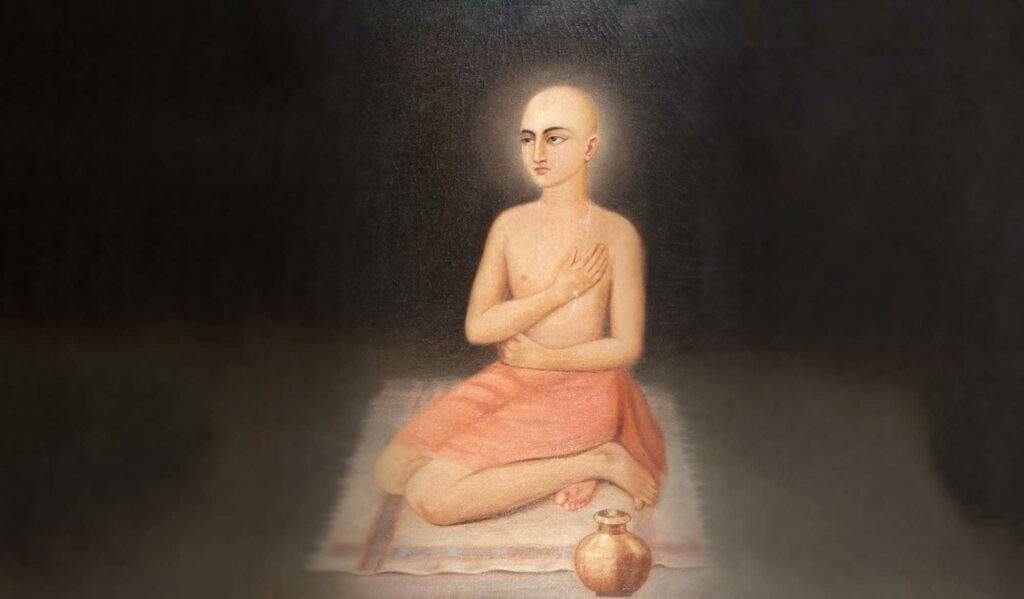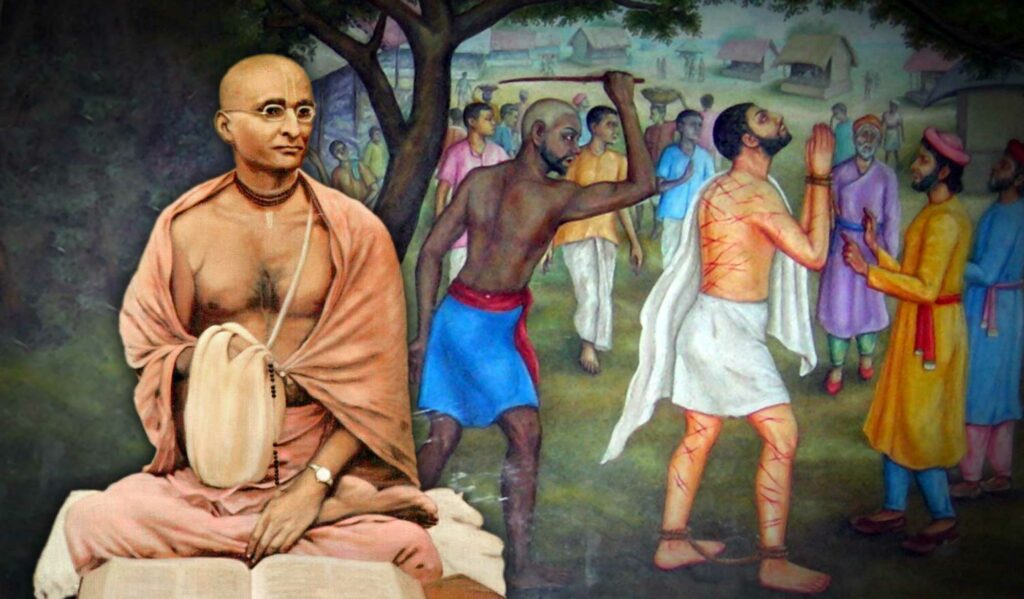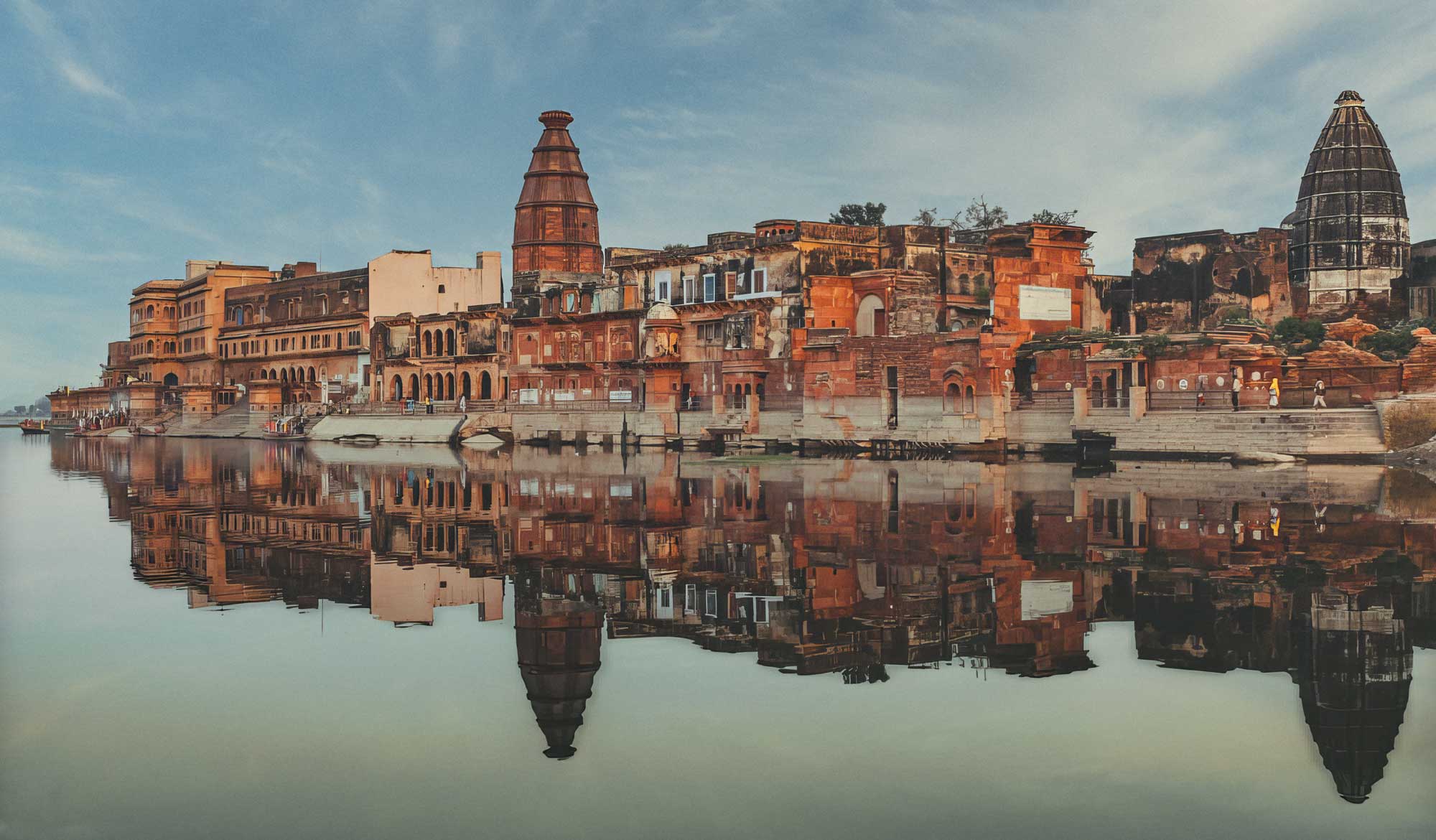Overview
Viraha-Gītikā (A Song of Separation) was first published in June 1952 in The Gauḍīya, Vol.3, Issue 5, on the occasion of Śrīla Bhaktivinoda Ṭhākura’s disappearance. In this Bengali song, Śrīla Purī Mahārāja narrates the position and achievements of Ṭhākura Bhaktivinoda, and prays to him for his mercy. This song has been translated into English by Swami B.V. Giri.
(1)
gadādharābhinna prabhu, bhaktivinoda vibhu
gaurāṅgaika-gati premamaya
gadādhara dina dhari, pāilena gaurahari
tiṅha more hauna sadaya
That great master, Śrī Bhaktivinoda, who is non-different from Gadādhara, is filled with prema and considers Gaurāṅga to be his only refuge. He attained Gaurahari on the same day as Gadādhara’s disappearance. May he be merciful unto me.
(2)
svānanda-sukhada-kuñje, gadāi-gaurāṅga raṅge
bhajichena yiṅha nirantara
nāma-prema-rase māti, yiṅho rahe divārāti
preme pulakita kalevara
At Svānanda Sukhada Kuñja, he constantly worshipped Gadāi-Gaurāṅga with bliss. Day and night, being intoxicated with the mellows of nāma-prema, the hairs on his body would stand on end due to divine love.
(3)
yāṅhāra suhṛd-vara, prabhu śrī-gaura-kiśora
yāṅra mukhe śuni bhāgavata
haitena baḍa prīta, prema-rase nimajjita
rahitena sadā sannihita
Śrī Gaura Kiśora Prabhu, who was the best of his most intimate associates, would listen to the Bhāgavata from his lips. Due to this, great love would arise in him and he would become immersed in the mellows of prema. Thus he would always remain in his close association.
(4)
sapārṣada gaurahari, līlā saṅgopana kari
vañcita karilā yabe dharā
kali-ghora timira, garāsila viśvājira
śuddha-bhakti hailā gupta tvarā
When Gaurahari and His associates deprived the world by concealing their līlā, the darkness of the terrible age of Kali quickly devoured the planet and pure bhakti immediately became concealed.
(5)
tabe gaura-icchā-vaśe, āṅdhāra gauḍīyākāśe
ūddharma-śārvara-hara rūpe
śuddha-bhakti-divya-jyotiḥ, śrī-gaura-karuṇā-śakti
udiyā rakṣilā jaga-jīve
Then, by the influence of Gaura’s sweet will, the darkness clouding the Gauḍīya firmament in the form of the thick gloom of atheism was dispelled. The divine effulgence of pure bhakti, the potency of Śrī Gaura’s mercy (Śrīla Bhaktivinoda Ṭhākura) arose in order to protect the jīvas of this world.
(6)
keha kare tāṅre stuti, (yena) bhagīratha mahāmati
śuddha-bhakti gaṅgā ānayane
gauḍīya gaurava tini, tiṅha vinā gauḍa-bhūmi
rasātale haita magane
Some have glorified him as being as magnanimous as Bhagīratha because he brought down the Gaṅgā of pure bhakti. He is the pride of the Gauḍīyas, for without him the land of Gauḍa would have descended into the hellish regions.
(7)
gauḍīya siddhānta sāra, karilā se su-pracāra
bhakti-grantha patrikādi dvāre
pātilā ye nāma-haṭṭa, yāhāte premera naṭṭa
kāmanāṭya rahe sadā dūre
He perfectly preached the essence of Gauḍīya siddhānta through devotional literature, journals etc. He created the nāma-haṭṭa (the marketplace of the Holy Name) where people danced in divine rapture and through this, their mundane desires were constantly driven far away.
(8)
śrī-gaurāṅga janma-sthāna, māyāpura divya-dhāma
prakāśiyā kailā viśvahita
(vaiṣṇava) sārvabhauma jagannātha, eka-mata tāṅra sātha
śrī-gaura-kiśora haraṣita
For the benefit of the world, he discovered the birthplace of Śrī Gaurāṅga in the holy dhāma of Māyāpura. Vaiṣṇava-Sārvabhauma Jagannātha Dāsa Bābājī agreed with his discovery, and Śrī Gaura Kiśora was most pleased.
(9)
navadvīpa-parikrama, pravarttilā anupama
āhā ki ānanda bhakta pāya
yogapīṭhe kendra kari, ṣola-krośa dhāma ghuri
punaḥ tathā pratyāvṛtta haya
He propagated navadvīpa-parikramā in an unparalleled way. Oh, what happiness the devotees feel by doing this! With the Yogapīṭha as their central focus, they wander through the forty-eight kilometres of the dhāma and then return there (to the Yogapīṭha).
(10)
śata-kaṇṭha sama-svare, gaura-guṇa gāna kare
hari-dhvani vyāpe tribhuvana
e ānanda yāṅra tare, prema-bhakti tāṅre smare
tāṅra pade saṅpe prāṇa-mana
Hundreds of voices sing the glories of Gaura in the same tune, and the sound of “Hari!” pervades the three worlds. Those who experience that bliss remember such prema-bhakti and offer their very life and minds unto that.
(11)
gaura-janma yātrā dine, aharniśa saṅkīrtane
māyāpure (yogapīṭhe) ki ānanda haya
bhakativinoda dāsa, tāṅra yei dāsa dāsa
sei tāhā preme āsvādaya
On the day of Gaura’s appearance in Māyāpura (at the Yogapīṭha) saṅkīrtana is held all day and night. What bliss is there! This servant of the servant of the servant of Bhaktivinoda relishes such prema.
(12)
lupta-tīrtha uddhāraṇa, bhakti-grantha prakāśana
śrī-mūrtira sevā paracāra
bhakti-sadācāra śikṣā, diyā sampradāya rakṣā
ācaryera kārya yata āra
He rediscovered hidden holy places, published devotional literature and preached about service to the Deity. He taught devotional etiquette, protected the sampradāya and performed the work of an ācārya.
(13)
sei saba sampādiyā, sampradāya saṁrakṣiyā
prabhu icchā karena pālana
ācāra pracāra nāmera, dui kārya ṭhākurera
tāṅra ceṣṭā apūrva kathana
Accomplishing all of this, he protected the sampradāya and fulfilled the desires of the Lord. He engaged in two activities connected to the Supreme, namely practicing and preaching about the Holy Name. Indeed, in this regard his endeavours were unparalleled.
(14)
(hā) gadāi gaurāṅga bali, kāṅdi hana beyākuli
se krandane galaye pāṣāṇa
punaḥ rādhā-kṛṣṇa-nāma, phukāri phukāri gāna
āṅkhi-nīre bhāsaye bayāna
Weeping and agitated, he would cry out, “O Gadāi-Gaurāṅga!” and his cries would melt stone. Again, he would loudly call out the Names of Rādhā-Kṛṣṇa constantly and his whole face would become inundated with tears pouring from his eyes.
(15)
āhā ki premera mūrti, dekhilei pāya sphūrti
vadane śrī-rādhā-śyāma nāma
pāpa-cintā dūre yāya, hṛdaya pavitra haya
tuccha saba haya jaḍa-kāma
O what an embodiment of prema! Simply upon seeing him, the Names of Śrī Rādhā-Śyāma appear within one’s mouth. Thoughts of engaging in impious activities go far away, one’s heart becomes pure and all mundane desires seem trivial.
(16)
kṛpāmbudhi prabhu mora, jīva-duḥkhe jhare lora
cinte kise jīva-hita haya
(tai) śāstra-sindhu sumathiyā, su-siddhānta sudhā niyā
granthākāre jīve vitaraya
My master is an ocean of mercy and upon seeing the misery of the jīvas, he wept and pondered how the jīvas could achieve some benefit. Therefore, he churned the ocean of śāstra and extracted the nectar of the proper siddhānta, distributing it to the jīvas in the form of books.
(17)
prakṛti-vaicitrya-krame, mata-bheda haya bhrame
dekhiyā cintilā anivāra
mahājana yei mata, tāhā hailā sugupata
kise jīva habe māyā-pāra
Because of material developments, gradually various erroneous philosophical opinions arose. Seeing this, he was constantly thinking how the philosophy of the mahājanas was being concealed. How would the jīvas be able to cross beyond māyā?
(18)
jīva-hita lāgi’ tāi, śuddha-bhakti-tattva gai
ghucailā jīvera saṁśaya
śrī-caitanya-śikṣāmṛta, jaiva-dharma ādi śata
grantha kailā gadya-padya-maya
For the welfare of the living entities, he sang about śuddha-bhakti-tattva (the principles of pure devotion), eliminating the doubts of the jīvas. He published hundreds of books such as Śrī Caitanya Śikṣāmṛta, Jaiva Dharma etc. in prose verse.
(19)
pāṣaṇḍa-dalana āra, śuddha-prema-paracāra
duikārya ācāryera haya
sei dui kārya kari’, prabhura iṅgita smari
divya-dhāme karilā vijaya
Eradicating the atheists, and practicing and preaching pure bhakti – these are the two aspects of an ācārya. Having engaged in these two activities, he remembered the Lord’s purpose and departed for the transcendental dhāma.
(20)
tad-abhinna nija-jana, prabhu sarasvatī hana
prabhu-mukhe śuni’ tāṅra kathā
ye kichu hṛdaye sphure, tāi gāhi ārti-bhare
prabhu-sukha smariyā sarvathā
My master, Śrīla Sarasvati Ṭhākura, who is a close associate of Śrīla Bhaktivinoda Ṭhākura, is non-different from him. I am speaking whatever I have heard from my master’s mouth. Whatever has been revealed in my heart I sing, filled with the pain of separation. In all respects, I remember My blissful master.
(21)
śrī-caitanya-prabhu-dayā, yāhā amanda udayā
tāhā bhaktivinoda rūpete
samudiyā dharā māhe, jīva hita sadā cāhe
tadupamā nā dekhi jagate
The mercy of Lord Śrī Caitanya arose with brilliance in the form of Bhaktivinoda appearing on the earth. He was always desiring the welfare of the jīvas and I have seen no one like him in this world.
(22)
hā hā prabhu dayā-maya, kara dayā amāyāya
(mora) prabhu-pade deha śuddhā rati
tāṅra kṛpā nā pāile, tava kṛpā nāhi mile
(tiṅha) dīna-hīna agatira gati
O prabhu, who is full of mercy! Be compassionate unto me without reservation. Give me pure attachment to the feet of my master. If I do not attain his mercy, I will not be able to achieve your mercy! He is the shelter for the poor and wretched who are without refuge.
(23)
hari-nāma cintāmaṇi, milāite pāra jāni
śuddha-nāme rati dite pāra
adhanya jīvana mora, sadānarthe rahe bhora
ohe nātha tāhe dhanya kara
I know that you are capable of putting me in contact with the touchstone of the Holy Name of Hari (hari-nāma cintāmaṇi) and you are able to give me attachment to śuddha-nāma. My life is inauspicious and always overwhelmed with unwanted tribulations. O lord, please make my life auspicious.
(24)
aparādha ghucāiyā, śuddha-nāme ruci diyā
prema-dāne tumi śakti kara
śrī-gaurāṅga tava dhana, tava prema-vaśya hana
tava kathā śune nirantara
You have the potency to remove offences, give a taste for śuddha-nāma and bestow prema. Śrī Gaurāṅga is your wealth and He is controlled by your prema. He always hears your words.
(25)
nirāśraya e adhame, deha sthāna śrī-caraṇe
guru-gaura-pade deha mati
śuddha-bhakta-dāsya diyā, śuddha-bhakti pradāniyā
rakṣa nātha adhame samprati
This person is without refuge and most fallen – please give him a place at your holy feet. Place my mind at the feet of Guru and Gaura. Give him service to the pure devotees, and bestow pure bhakti upon him. Protect this fallen person now, O lord.
(26)
tridaṇḍa sannyāsa dharma, bujhāiyā kara śarma
bhaktite pramoda yena haya
(śrī) purīpāda-dāsya diyā, śuddha-prema bujhāiyā
bhajanete karaha tanmaya
Explain to me the dharma of tridaṇḍa-sannyāsa and make me blissful in bhakti (bhakti-pramoda). Give me service unto the feet of Śrī Mādhavendra Purī, describe pure prema to me, and make me absorbed in bhajana.
(27)
ājikāli ka’re dina, ca’le yāya, tanu-kṣīṇa
nāhi bhela bhajana sādhana
para-svabhāva karma lai’, stuti nindāya māti’ rai
nija-doṣa nā khuṅji kakhana
At present, the days are passing by, my body is becoming feeble and I have not performed any sādhana or bhajana. I continue to praise and criticise the nature and activities of others, never perceiving my own faults.
(28)
emana durlabha janma, labhiyā nā bujhi marma
kāṭāinu tāhā avahele
tava upadeśa-vāṇī, śuniyāo nāhi śuni
hāya janma haila viphale
Attaining such a rare birth, I have not understood its significance and have spent it carelessly. Despite hearing your instructions, I did not listen! Alas! This life has been fruitless.
(29)
su-kalyāṇa kalpa-taru, prakaṭilā mājhe maru
se chāyāya nā nilu śaraṇa
śaraṇāgati nā haila, janma mora vṛthā gela
hāya hāya ki kari ekhana
You have revealed the most auspicious desire tree in the middle of a desert, yet I did not take refuge in its shade. I have not engaged in śaraṇāgati (the process of surrender) and my life has been in vain. Alas! Alas! Now what shall I do?
(30)
durbāra indriya-gaṇa, jaḍāsakta anukṣaṇa
mana kabhu mānā nāhi śune
ki kari ekhana bala, āmi ati durabala
kṛpā-bale rākhaha caraṇe
The senses are most impetuous, material attachments are constant, and the mind never listens to anything beneficial at any time. Please tell me, what should I do now? I am completely without any power. By the power of your mercy, please keep me at your feet.
(31)
prabhu-mukhe tava guṇa, kata nā kainu śravaṇa
bhāgya-doṣe nā haya smaraṇa
tava guṇa-gāthā saṅge, nāhi mile mana raṅge
kise habe tomāte milana
Did I not hear your qualities from the mouth of my master? Yet, due to misfortune, I do not remember them. My mind finds no pleasure in singing your glories amongst proper association, so how will I meet you?
(32)
milana vinā viraha, nā bujhite pāre keha
virahei milana ghaṭana
tava guṇe prīti vine, tavābhāva nāhi jñāne
nāhi sphure viraha-vedana
Without union, nobody can understand separation. It is through separation that union occurs. Without love for your qualities, one cannot comprehend your absence and the pangs of separation will never manifest.
(33)
virahe milana sphūrti, tāhe utsava pūrti
tāhā vinā sakali viphala
(tāi) sumedhasa tithi nāma, dilā prabhu guṇa-dhāma
ārādhile sakali saphala
Union manifests due to separation, and that is the fulfilment of a (disappearance) observance. Without that, everything is futile. Therefore, our master, who is an abode of all divine qualities, referred to this day as a day of divine remembrance, and through worship (of the previous ācārya), everything becomes successful.
(34)
gaura-priya-janābhāva, ye hṛdaye anubhava
se hṛdaye śrī-gaurāṅga sphure
gaura-priye premābhāve, nahe gaura anubhave
gaura-kṛpā rahe bahudūre
Śrī Gaurāṅga manifest within the heart of those who experience the absence of the dear associates of Gaura. Persons who are devoid of love for those who are dear to Gaura cannot experience Him. The mercy of Gaura remains far from them.
(35)
hā gaurāṅga nija-jana, kara more kṛpekṣaṇa
suprasanna hao he antare
tava kṛpā-lava ha’le, guru-gaura-kṛpā mile
sarva-siddhi milaye sattvare
O intimate associate of Gaurāṅga! Grace me with your merciful sidelong glance! Kindly be pleased with me within. When a particle of your mercy and the mercy of guru and Gaura is attained, then all perfection is swiftly achieved.
(36)
śrī-bhaktivinoda jaya, gaura-prema-rasamaya
jaya jaya rādhā-nitya-jana
eka-mātra hari-līlā, yāṅhāra pramoda chilā
vandi muhuḥ tāṅhāra caraṇa
All glories unto Śrī Bhaktivinoda who fully possesses gaura-prema-rasa (the mellows of transcendental love for Gaura). All glories, all glories unto he who is an eternal associate of Rādhā. His only happiness was hari-līlā, the pastimes of Hari. Again and again, I offer respects unto his feet.
(37)
kāṅhā se premera dhāma, sarva-guṇa-gaṇārāma
kāṅhā tāṅra abhinna bāndhava
kāṅhā sei prabhupāda, purāite yāṅra sādha
pracārilā gauḍīya gaurava
Where is that abode of prema within whom all divine qualities find repose? Where is his companion who is non-different from him? Where is that Prabhupāda (Sarasvatī Ṭhākura) who fulfilled his desire to propagate the dignity of the Gauḍīyas?
(38)
eke eke sabe hāya, praviṣṭa nitya-līlāya
saṅga-bhāgye hainu vañcita
kena vā āchaye prāṇa, ki sukha karite dhyāna
kṛpā kari’ kara ātmasāta
Alas! One by one they have all entered the eternal pastimes. I have been deprived of their fortunate association. Why continue to live? What kind of happiness can I meditate upon? Being merciful, please take me!
Related Articles, Songs and Prayers
- Śrī Gaura-hari Kusuma Stavāṣṭākam by Śrīla Bhakti Rakṣaka Śrīdhara Deva Gosvāmī
- Śrī Kusumañjalī (An Offering of Flowers) by Śrīla Bhakti Rakṣaka Śrīdhara Deva Gosvāmī
- Śrī Nāma Māhātmya (The Glories of the Holy Name) by Śrīla Bhakti Rakṣaka Śrīdhara Deva Gosvāmī
- Śrī Nityānanda Dvādaśakam by Śrīla Bhakti Rakṣaka Śrīdhara Deva Gosvāmī
- Śrīmad Bhaktivinoda Viraha Daśakam by Śrīla Bhakti Rakṣaka Śrīdhara Deva Gosvāmī
- Śrī Śrī Gaurasundara Āvirbhava Vāsare by Śrīla Bhakti Rakṣaka Śrīdhara Deva Gosvāmī
- ‘The Best of Thieves’ – An Illumination by Śrīla Bhakti Rakṣaka Śrīdhara Deva Gosvāmī
- Mā Muñca Pañca-daśakam (Fifteen Verses Praying Not to be Abandoned) by Śrīla Śrīdhara Deva Gosvāmī Mahārāja
- Śrīla Sarasvatī Gosvāmyāṣṭakam by Śrīla Śrīdhara Deva Gosvāmī Mahārāja
- Vṛndāvane Bhajana (Worship in Vṛndāvana) by Śrīla A.C. Bhaktivedānta Swami Prabhupāda
- Vaiśiṣṭyāṣṭaka (Eight Stanzas of Significance) by Śrīla A.C. Bhaktivedānta Swami Prabhupāda
- Svasti No Gaura-vidhur Dadhātu (May the Moon-like Gaura Bestow Auspiciousness) by Śrīla B.P. Purī Mahārāja
- A Prayer Composed on the Occasion of the Disappearance of Śrīla Gadādhara Paṇḍita by Śrīla Bhakti Pramoda Purī Gosvāmī
- Śrī Śrī Gaura Gopāla Praśasti (In Praise of Śrī Śrī Gaura Gopāla) by Śrīla Bhakti Pramoda Purī Gosvāmī
- Viraha-Gītikā (A Song of Separation) by Śrīla Bhakti Pramoda Purī Mahārāja
- Jaya Rādhā-Mādhava by Śrīla Bhakti Gaurava Narasiṅgha Mahārāja
- Purport to Śrīla Prabhupāda-līlā Smaraṇa-Maṅgala Stotram by Śrīla Bhakti Gaurava Narasiṅgha Mahārāja
- Purī Mahārāja’s Praṇāma Mantra by Śrīla Bhakti Gaurava Narasiṅgha Mahārāja
- Śrī Guru-viraha Ṣaṭakam – Six Verses in Separation from Śrī Guru by Swami B.V. Giri
- Śrī Guru Praṇāma Anuvākya – An Explanation of Śrīla Guru Mahārāja’s Praṇāma Mantra by Swami B.V. Giri
Further Reading from the Bhaktivinoda Institute
- Gītā-mālā (A Garland of Songs) by Śrīla Bhaktivinoda Ṭhākura (Songbook)
- Kalyāṇa Kalpataru (‘The auspicious Desire Tree’) by Śrīla Bhaktivinoda Ṭhākura (Songbook)
- Śaraṇāgati (Surrendered to the Lord’s Shelter) by Śrīla Bhaktivinoda Ṭhākura (Songbook)
- Gītāvalī (A Collection of Songs) by Śrīla Bhaktivinoda Ṭhākura (Songbook)
- Bāula Saṅgīta by Śrīla Bhaktivinoda Ṭhākura (Songbook)
- Sevā Lālasā (Hankering for Service) by Śrīla Bhaktivinoda Ṭhākura (Songbook)
- Śrī Godruma-candra Bhajanopadeśa by Śrīla Bhaktivinoda Ṭhākura
- Śrī Kṛṣṇacandra by Śrīla Bhaktivinoda Ṭhākura
- Śrī Gīta Govinda Introduction by Śrīla Bhaktivinoda Ṭhākura
- Poems by Śrīla Bhaktivinoda Ṭhākura
Pilgrimage with Swami Narasiṅgha – Part 7: Keśī Ghāṭa
Continuing with our pilgrimage series, this week Śrīla Narasiṅgha Mahārāja takes us to Keśī Ghāṭā where he tells us about Madhumaṅgala’s meeting with the Keśī demon, what Keśī represents, and how Śrīla Prabhupāda almost acquired Keśī Ghāṭa. Mahārāja also narrates his own experience. This article has been adapted from a number of talks and articles by Narasiṅgha Mahārāja.
Prema Dhāma Deva Stotram with the Narasiṅgha Sevaka Commentary – Verses 61-65
In verses 61 to 65 of 'Prema Dhāma Deva Stotram', Śrīla Śrīdhara Mahārāja narrates the pastime of Śrī Caitanya at Caṭaka Parvata In Purī and explains how the scriptures produced by Brahmā and Śiva are ultimately searching for the personality of Mahāprabhu who is merciful too all jīvas, no matter what their social position.
Prabhupāda Śrīla Sarasvatī Ṭhākura’s Visit to Ayodhyā
With the forthcoming observance of Śrī Rāma Navamī, we present 'Prabhupāda Śrīla Sarasvatī Ṭhākura’s Visit to Ayodhyā' written by Śrīla Bhaktisiddhānta Sarasvatī Ṭhākura Prabhupāda from The Gaudīyā magazine, Vol 3. Issue 21/ In December 1924, after visiting Benares and Prāyāga, Sarasvatī Ṭhākura visited the birth-site of Śrī Rāmācandra in Ayodhyā.
Śaraṇāgati – The Only Path to Auspiciousness
In this article, 'Śaraṇāgati - The Only Path to Auspiciousness', Dhīra Lalitā Dāsī analyses the process of śaraṇāgati (surrender) beginning with śraddhā (faith). She also discusses the role of śāstra and the Vaiṣṇava in connection with surrender.
Pilgrimage with Swami Narasiṅgha – Part 7: Keśī Ghāṭa
Continuing with our pilgrimage series, this week Śrīla Narasiṅgha Mahārāja takes us to Keśī Ghāṭā where he tells us about Madhumaṅgala’s meeting with the Keśī demon, what Keśī represents, and how Śrīla Prabhupāda almost acquired Keśī Ghāṭa. Mahārāja also narrates his own experience. This article has been adapted from a number of talks and articles by Narasiṅgha Mahārāja.
Prema Dhāma Deva Stotram with the Narasiṅgha Sevaka Commentary – Verses 61-65
In verses 61 to 65 of 'Prema Dhāma Deva Stotram', Śrīla Śrīdhara Mahārāja narrates the pastime of Śrī Caitanya at Caṭaka Parvata In Purī and explains how the scriptures produced by Brahmā and Śiva are ultimately searching for the personality of Mahāprabhu who is merciful too all jīvas, no matter what their social position.
Prabhupāda Śrīla Sarasvatī Ṭhākura’s Visit to Ayodhyā
With the forthcoming observance of Śrī Rāma Navamī, we present 'Prabhupāda Śrīla Sarasvatī Ṭhākura’s Visit to Ayodhyā' written by Śrīla Bhaktisiddhānta Sarasvatī Ṭhākura Prabhupāda from The Gaudīyā magazine, Vol 3. Issue 21/ In December 1924, after visiting Benares and Prāyāga, Sarasvatī Ṭhākura visited the birth-site of Śrī Rāmācandra in Ayodhyā.
Śaraṇāgati – The Only Path to Auspiciousness
In this article, 'Śaraṇāgati - The Only Path to Auspiciousness', Dhīra Lalitā Dāsī analyses the process of śaraṇāgati (surrender) beginning with śraddhā (faith). She also discusses the role of śāstra and the Vaiṣṇava in connection with surrender.








